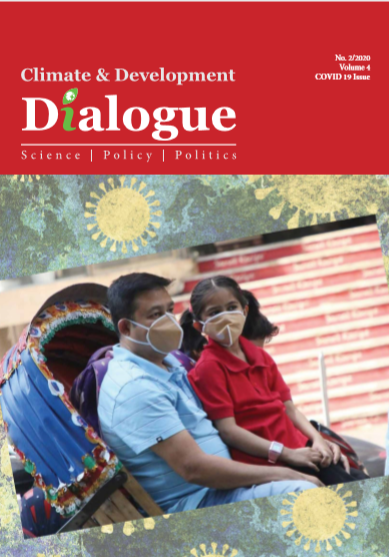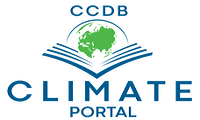Climate & Development Dialogue

COVID-19 has thrown the world into an unprecedented crisis. Its public health and socioeconomic consequences will be painfully palpable for years. And so far, we have only experienced the tip of the iceberg. Whilst many nations of the Global South are still suffering from the first wave of infection, East Asia, Europe and North America are wisely bracing for a second wave due this fall, if not earlier. It would be foolish to count on the development of a vaccine before that, let alone in the quantities that would be required to lessen a second wave’s impact. But even if a vaccine were to be developed in the next year, the social and economic devastations that the pandemic has already wrought across the world will have profound and long-lasting effects.
The rate of infection may be decreasing in most of Germany and Europe. The socioeconomic crisis, however, has only just begun. It will provoke a deep shift in the way the world is run. The world of tomorrow will no longer be the world that we knew before COVID-19. Many of our habits and approaches to solving problems will need to be rethought. The health care systems and supply chains that have focused on efficiency and cost-reduction so far will have to begin to prize flexibility and resilience. There is much to suggest that pandemics like the one caused by COVID-19 will reoccur in the future for many reasons, for example, because the habitats are shrinking of many of the wild animals that harbor zoonotic pathogens. Scientific projections suggest that by the end of this decade, the challenges that climate change will be confronting us with will dwarf those of the current COVID-19 crisis.
Since the end of the Cold War, we in Germany and Europe—unlike in the developing world—have forgotten the extent to which our societies are in fact risk societies. This new Coronavirus threat, however, has returned to us a sense of risk in which the individual feels powerless. But that is not necessarily our fate. We can defeat it. And we need preventative action on the societal level, not collective denial. Changes, even painful ones, can be creative if they promise a new beginning.
COVID-19 is changing the world and undermining our societies in a way that parallels climate change. The difference, however, is that there is no end of climate change in sight, unlike of COVID-19, which eventually will subside when a vaccine is discovered or herd immunity is achieved. To deal with climate change, the only choice is containment at an early stage. But containment is precisely what the world, with a few positive exceptions like Taiwan, failed to do with COVID-19 because the vast majority of countries did not take the threat seriously soon enough. How much human suffering, and what economic damages and financial costs would humanity have been spared if the world had succeeded in containing COVID-19 as quickly and effectively as Taiwan had?
We must learn from our mistakes in our response to COVID-19 if we are to mitigate climate change. We must decisively limit global warming to 1.5ºC. We have ten years for it, which is approximately the period that it will take us to fully process the economic and financial consequences of COVID-19. Our only choice is to link our strategies in dealing with the Coronavirus and climate crises. Any attempt to deal only with the former by relying on established approaches to monetary, fiscal, industrial, and economic policy, and thereby ignore the imperative for transformation in the face of climate change will inexorably end in defeat. Firstly, every further delay in undertaking ambitious climate action further diminishes the small window of time in which containment (that is, the limitation of global warming to 1.5ºC) is at all possible. Secondly, the global costs involved in a recovery strategy for COVID-19 will be so high and will lead to so much debt that it will scarcely be possible to make similar or higher investments into climate change mitigation soon. And thirdly, conventional stimulus programs that ignore climate policy unavoidably will lead to stranded assets and bankruptcies due to no longer viable business models, to unemployment, social disintegration, poverty, and further political polarization.
Conversely, we can overcome both the Coronavirus and the climate crises if we start on the right path today. We must create stimulus packages that focus on promoting sustainable, future-proof business models. We must raise instead of lower the ambition of our climate policies, and accelerate instead of delay the transformation of the energy, transportation, and agricultural sectors, as well as of our buildings and cities. Finally, we must couple these stimulus programs with short-term emergency packages and long-term structural reform. This crucial decade could become a decade of transformation. We could contain the crisis of biodiversity, protect the planetary boundaries, and put an end to the harrowing increases in global inequality. If this opportunity is taken advantage of right now, humanity will one day be able to look back at the Coronavirus and climate crises, strengthened. Our success, however, depends on designing the right strategy, the characteristics of which will be expanded upon in the following.
- Publisher: The Center for Participatory Research and Development (CPRD) Download

